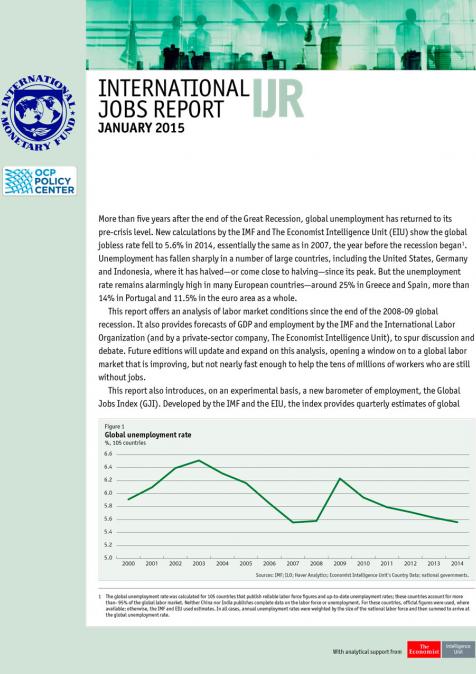RELATED CONTENT
-
 AuthorsPierre-Richard AgénorJanuary 24, 2015OCP Policy Center est ravi de recueillir vos commentaires et d’engager la discussion autour de la publication de son dernier livre sur la stratégie de croissance du Maroc à l’horizon 2025 dans un environnement international en mutation, co-écrit par Pierre Richard Agénor et Karim El Aynaoui. L’économie marocaine fait actuellement face au risque de se retrouver « prise en tenaille », entre, d’un côté les pays à faible revenu en croissance rapide, bénéficiant d’une main-d’œuvre abond ...
AuthorsPierre-Richard AgénorJanuary 24, 2015OCP Policy Center est ravi de recueillir vos commentaires et d’engager la discussion autour de la publication de son dernier livre sur la stratégie de croissance du Maroc à l’horizon 2025 dans un environnement international en mutation, co-écrit par Pierre Richard Agénor et Karim El Aynaoui. L’économie marocaine fait actuellement face au risque de se retrouver « prise en tenaille », entre, d’un côté les pays à faible revenu en croissance rapide, bénéficiant d’une main-d’œuvre abond ... -
AuthorsPierre-Richard AgénorJanuary 24, 2015The Moroccan economy is currently facing the risk of becoming caught between the rapid-growing low-income countries with abundant and cheap labor, and middle-income countries that are able to innovate quickly. In addition, China’s massive investments in Sub-Saharan Africa have accelerated the participation of some countries in the region in a new international division of labor, especially in low-skill-intensive light manufacturing. In parallel, through the structure of its trade a ...
-
 AuthorsJanuary 23, 2015The year just ending disappointed economic forecasters, as did the year prior, and the one before that. The aftereffects of the Lehman crisis, now over six years old, and of the subsequent sovereign crisis in Europe, have been systematically underestimated and continue to plague us. Although the outlook for 2015 is foggier than usual, there are significant areas of strength and many signs that the world economy continues to heal, beginning from here in the United States. The coll ...
AuthorsJanuary 23, 2015The year just ending disappointed economic forecasters, as did the year prior, and the one before that. The aftereffects of the Lehman crisis, now over six years old, and of the subsequent sovereign crisis in Europe, have been systematically underestimated and continue to plague us. Although the outlook for 2015 is foggier than usual, there are significant areas of strength and many signs that the world economy continues to heal, beginning from here in the United States. The coll ... -
AuthorsJanuary 14, 2015The International Jobs Report offers an analysis of labor market conditions since the end of the 2008-09 global recession. It also provides forecasts of GDP and employment by the IMF and the International Labor Organization (and by a private-sector company, The Economist Intelligence Unit), to spur discussion and debate. Future editions will update and expand on this analysis, opening a window on to a global labor market that is improving, but not nearly fast enough to help the tens ...
-
AuthorsJanuary 10, 2015La chute des prix pétroliers observée depuis le milieu de l’année 2014 s’explique par la conjonction d’un excès d’offre et par une insuffisance de la demande dans un contexte économique mondial morose. Le niveau des prix ne peut cependant être la seule variable à prendre en compte dans une analyse prospective des effets macroéconomiques de cette baisse : structure par terme et volatilité des prix constituent ici des éléments explicatifs fondamentaux. ...
-
AuthorsJanuary 10, 2015The fall in oil prices since mid-2014 is due to the combination of excess supply and a lack of demand in a sluggish global economy. However, the price level cannot be the only variable to consider in a prospective analysis of the macroeconomic effects of this drop: futures structure and price volatility are fundamental explanatory elements. ...
-
-
-
-






